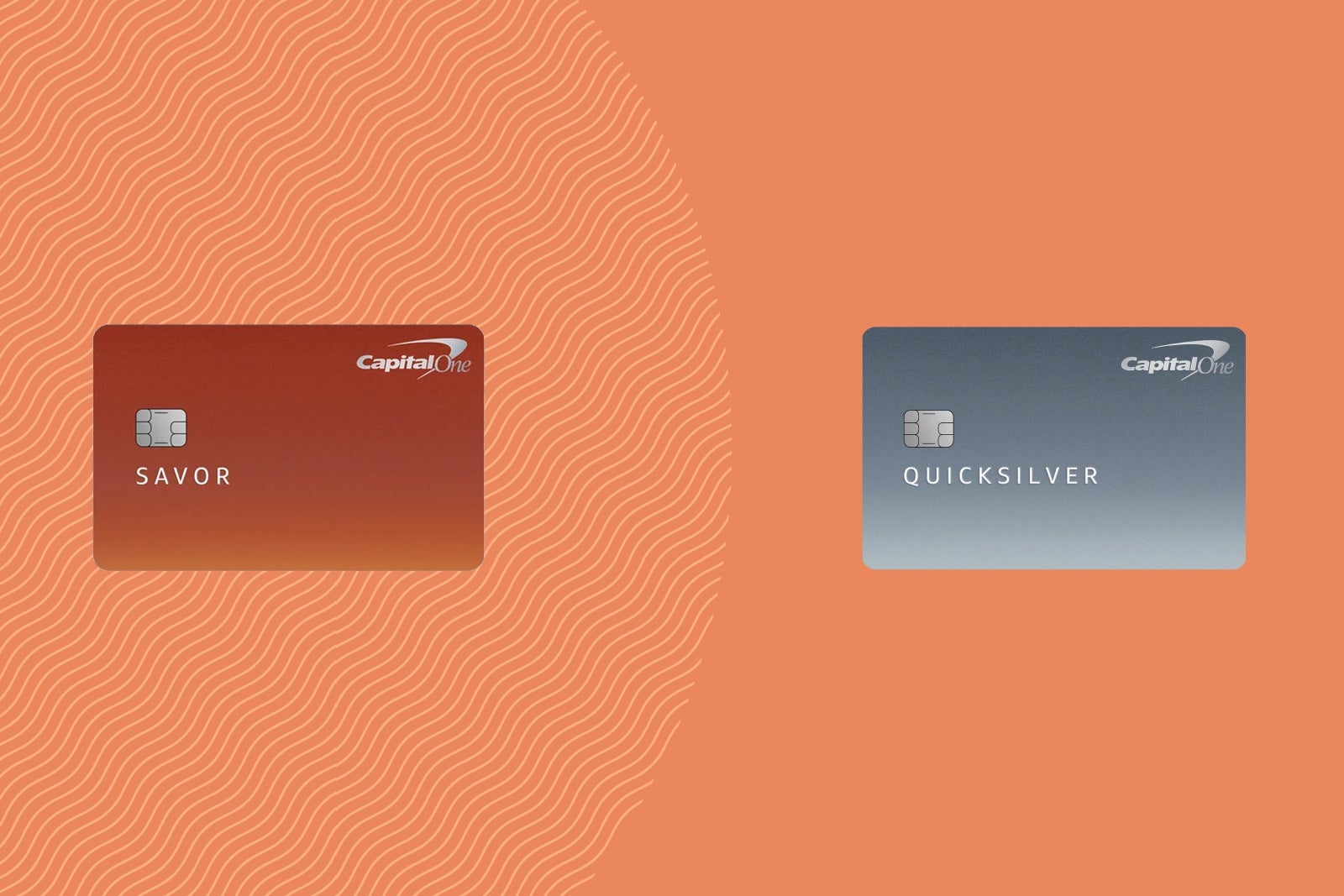Capital One Savor vs. Capital One Quicksilver: Supercharge your leisure spending, or earn flat cash back?
Editor's Note
For many people, cash-back rewards rank highly in their spending strategy. These cards often have simple earning rates and easy-to-understand redemption options, making them a staple in many wallets.
If you're in the market for a cash-back credit card, you have many factors to consider. Do you want a simple fixed-rate rewards card to earn a set percentage back on every purchase? Are you willing to maximize bonus categories to make the most of your dining, grocery or travel expenses?
Capital One offers two solid cash-back options: the Capital One Savor Cash Rewards Credit Card and the Capital One Quicksilver Cash Rewards Credit Card. There are several similarities between these two cards, including the fact they both earn cash back that you can redeem in multiple ways.
However, some key differences exist — particularly with each card's respective earning rates.
Here's a rundown to help you make an informed choice between these two popular choices.
Capital One Savor vs. Capital One Quicksilver card comparison
| Benefit | Savor | Quicksilver |
|---|---|---|
Welcome offer | Earn a one-time $200 cash-back bonus after spending $500 on purchases in three months from account opening. | Earn a one-time $200 cash-back bonus after spending $500 on purchases in three months from account opening. |
Annual fee | $0 | $0 |
Earning rates |
|
|
Additional benefits |
|
|
Capital One Savor vs. Capital One Quicksilver welcome offer
The Capital One Savor and the Capital One Quicksilver offer identical welcome bonuses.
With either card, you can earn a one-time $200 cash-back bonus after spending $500 on purchases in three months from account opening.

This is a solid offer for either cash-back option and requires a relatively low minimum spending requirement to earn.
When you go to apply, remember that Capital One has some potentially confusing application rules that might restrict your eligibility for either card.

The issuer is also known to restrict consumers to opening just one new card every six months, so if you've applied for another Capital One product within that time frame, you might want to hold off.
Winner: Tie. The offers are the same.
Capital One Savor vs. Capital One Quicksilver benefits
Neither the Capital One Savor nor the Capital One Quicksilver offers a major slate of other benefits comparable to more premium rewards cards. However, they still have a few perks worth noting.
Both waive foreign transaction fees. They also offer concierge services, extended warranty protection and travel accident insurance.

Finally, neither card charges an annual fee, so you'll receive all of these perks just by holding the card.
Winner: Tie. Both cards offer similar (albeit valuable) benefits.
Related: What's covered by credit card travel accident and emergency evacuation insurance?
Earning cash back with the Capital One Savor vs. Capital One Quicksilver
The real difference between these two cards comes into play with their earning rates.
The Capital One Quicksilver is an appealing option for anyone looking for simplicity, as the card earns at least 1.5% cash back on all purchases.
This falls in line with competitors from other issuers, such as the Chase Freedom Unlimited® (see rates and fees), but it's less than you can expect with other cards, such as the Citi Double Cash® Card (see rates and fees).

By contrast, the Capital One Savor could be a better choice for those willing to manage bonus categories in their card strategy. The card is also a good option if you frequently dine out, shop for groceries or attend live events.
When you pay with the Savor Rewards, you'll earn:
- 3% cash back on purchases at grocery stores (excluding superstores like Walmart and Target)
- 3% cash back on dining
- 3% cash back on entertainment
- 3% cash back on popular streaming services
Both cards will earn 5% on hotels, vacation rentals and rental cars booked through Capital One Travel.
Winner: Savor. You have more opportunities to earn bonus cash back than with the Quicksilver.
Related: The best 2% cash-back credit cards
Redeeming cash back with the Capital One Savor vs. the Capital One Quicksilver
Both are cash-back cards, plain and simple. You can redeem your cash back in different ways, including as statement credits, as credits toward previous purchases, by shopping at Amazon, by checking out with PayPal or as gift cards.

These are all good redemption options for cash-back credit cards. Since you aren't dealing with points and miles, you don't need to worry about picking the right redemption option for maximizing value. Your cash back will always be worth the same amount, regardless of how you redeem it.
Winner: Tie. The two cards have the same redemption options.
Related: Common mistakes to avoid when using a cash-back credit card
Should I get the Capital One Savor or the Capital One Quicksilver?
It depends on where you spend your money. Since the cards have so many similarities outside of their earning rates, consider your spending habits before you make a decision. The Capital One Quicksilver is a great option for folks who tend to make purchases at a wide variety of merchants. Conversely, the Capital One Savor is tailor-made for people who spend a lot on dining, entertainment and groceries.
Related: How to assess and build your credit card portfolio
Bottom line
Both the Savor and the Quicksilver are strong cash-back options with many similarities. The decision will come down to whether you'll maximize the Savor's bonus categories or appreciate the Quicksilver's fixed-rate cash back.
Consider how you spend before you make a choice, and you'll be set to rack up cash-back rewards.
To learn more, read our full reviews of the Capital One Savor and the Capital One Quicksilver.
Learn more: Capital One Savor Cash Rewards Credit Card
Learn more: Capital One Quicksilver Cash Rewards Credit Card
For Capital One products listed on this page, some of the benefits may be provided by Visa® or Mastercard® and may vary by product. See the respective Guide to Benefits for details, as terms and exclusions apply.


